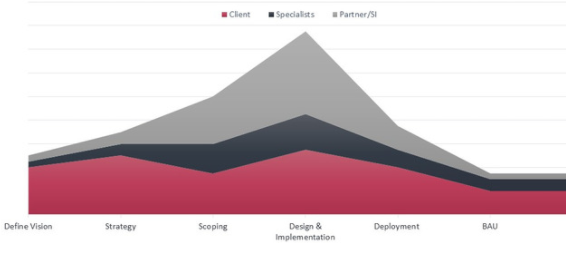
In today's fast-paced digital era, businesses are increasingly investing in digital transformation projects. While these endeavors hold the promise of great success, they also come with their fair share of challenges. One of the key factors that can make or break a digital transformation project is the composition of your team. In this article, we explore the critical aspects organisations should consider when embarking on a transformation project, specifically delving into the importance of building a reliable internal function.
The Art of Balance
Achieving the right balance between internal and external resources, such as partner companies or system integrators (SIs), is fundamental to the success of any implementation. The composition of your team not only influences how your organisation operates and maintains the system over its lifecycle but also significantly impacts its internal adoption.
By establishing a robust internal capability at the right juncture, your organisation stands to gain:
- Internal Knowledge: Valuable expertise that remains within the organisation.
- Smooth Transition: A seamless handover and simplified ongoing support.
- Sustainable Enhancements: The capacity to continue improving your system.
- Cost Efficiency: A blended team approach can often reduce costs compared to over-reliance on external partners.
The stakes are high for organisations, considering the unique motivations of in-house candidates who tend to be deeply invested in the project's success. However, overly relying on internal resources too early can be counterproductive if your team lacks experience or technical know-how. Thus, meticulous planning is essential to start building your internal team at the right time.
As pointed out by Adrian Smythe, a project manager with over two decades of experience working with SIs and internal teams:
"The internal team should initiate project-preparation work well before any partner steps in. This includes strategic planning, thorough business analysis, and detailed planning. A strong core team is essential for project success."
Here are Adrian's top four insights for successful project delivery:
- Accountability: The success or failure of the project lies with the customer; accountability cannot be delegated.
- Responsibility: While responsibility can be delegated, it requires a collaborative effort with the partner, ensuring they have everything they need, including data, resources, and trust.
- Guidance: Skilled resources from the partner should lead requirement gathering workshops, followed by validation from the customer.
- Trust: The core internal team, led by an executive-level sponsor, must be trusted, experienced, and tenured.
So, the question remains: What's the right approach for your organisation, and when should you make this crucial decision?
Typically, the team's composition evolves over the course of the project. Initial phases may require a higher concentration of partner resources and specialist contractors. As the project matures and knowledge transfer takes place, the balance tilts toward strengthening the internal team, with a reduced reliance on external resources.

Global Implementations
For global implementations, we recommend transitioning to internal capabilities by the second or third rollout. This way, you can build upon the expertise of the experts and replicate a successful template, while addressing and overcoming potential pitfalls and challenges. However, global rollouts come with their own set of challenges, including diverse priorities, cultural influences, and financial considerations. Localized support and input often play a crucial role.
Building a Centre of Excellence
To tackle the complexities of global implementations, consider establishing a Center of Excellence (CoE). When done right, a CoE acts as a central hub, breaking down geographic and organisational barriers while providing standards, consistency, and governance to your organisation.
A successful CoE comprises a team managed centrally, with a focus on maintaining standards and driving the initiative. Key roles to consider include project managers, business analysts, solution architects, functional consultants, testers, and support analysts. Larger projects may necessitate a more extensive team.
Every project is unique, and the timing of building internal capabilities depends on your organisation's existing talent and readiness to support the transformation journey. Nevertheless, overlooking the importance of this step can be detrimental to project success, so it should be a top priority. While building a Center of Excellence can ensure consistency and standards, remember that you can always supplement permanent resources with specialist contractors as needed. The key is to define clear roles and responsibilities, document outcomes, and allocate a sufficient budget.
Start strengthening your internal capabilities today. If you seek advice on when and how to initiate this process or want to explore the benefits of establishing a Center of Excellence, don't hesitate to get in touch. We're here to have a conversation about what this could look like for your organisation.
Contact Laura Cogger
Email: laura.cogger@cognitive-group.com



